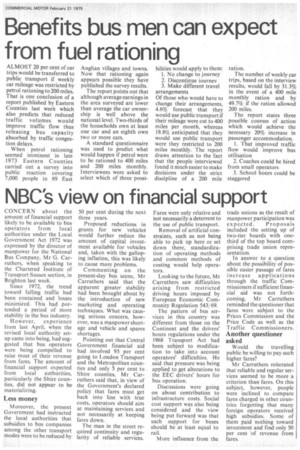NBC's view on financial support
Page 25

If you've noticed an error in this article please click here to report it so we can fix it.
CONCERN about the amount of financial support likely to be available to bus operators from local authorities under the Local Government Act 1972 was expressed by the director of manpower for the National Bus Company, Mr G. Carruthers, when speaking to the Chartered Institute of Transport Sussex section, in Brighton last week.
Since 1972, the trend toward falling traffic had been contained and losses minimized. This had portended a period of more stability in the bus industry.
However, experience from last April, when the revised local authority setup came into being, had suggested that bus operators were being compelled to raise most of their revenue from fares. The amount of financial support expected from local authorities, particularly the Shire counties, did not appear to be materializing.
Less money
Moreover, the present Government had instructed the local authorities that subsidies to bus companies among the other transport modes were to be reduced by 50 per cent during the next three years.
Proposed reductions in grants for new vehicle§ would further reduce the amount of capital investment available for vehicles and, taken with the galloping inflation, this was likely to cause more problems.
Commenting on the present-day bus scene, Mr Carruthers said that the apparent greater stability had been brought about by the introduction of new marketing and operating techniques. What was causing serious concern, however, was a manpower shortage and vehicle and spares shortages.
Pointing out that Central Government financial aid had involved 95 per cent going to London Transport and the Metropolitan counties and only 5 per cent to Shire counties, Mr Carruthers said that, in view of the Government's declared policy that fares must get back into line with true costs, operators should aim at maintaining services and not necessarily at keeping fares down.
The man in the street required continuity and regularity of reliable services. Fares were only relative and not necessarily a deterrent to the use of public transport.
Removal of artificial constraints, such as not being able to pick up here or set down there, standardization of operating methods and common methods of costing would help operators.
Looking to the future, Mr Carruthers saw difficulties arising from restricted driving hours imposed by European Economic Community Regulation 543/69.
The pattern of bus services in this country was different from those on the Continent and the drivers' hours regulations under the 1968 Transport Act had been subject to modification to take into account operators' difficulties. He said that pressure was being applied to get alterations to the EEC drivers' hours for bus operation.
Discussions were going on about contribution to infrastructure costs. Social cost support was also being considered and the view being put forward was that such support for buses should be at least equal to rail.
More influence from the trade unions as the result of manpower participation was expected. Proposals included the setting up of two-tier boards with onethird of the top board comprising trade union representation.
In answer to a question. about the possibility of possible easier passage of fares increase applications through the traffic Commissioners if sufficient financial aid was not forthcoming, Mr Carruthers reminded the questioner that fares were subject to the Prices Commission and the Price Code as well as the Traffic Commissioners.
Another questioner asked
Would the travelling public be willing to pay such higher fares?
Mr Carruthers reiterated that reliable and regular services seemed to be more a criterion than fares. On this subject, however, people were inclined to compare fares charged in other countries forgetting that many foreign operators received high subsidies. Some of them paid nothing toward investment and find only 50 per cent of revenue from fares.












































































































